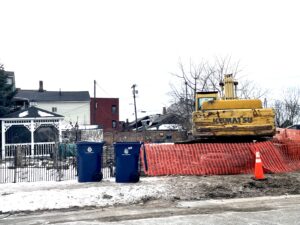The City of Buffalo is currently weighing the value of a Land Value Taxation – “a tax system that taxes the value of land independent of any buildings or improvements on it.”
For years, proponents of this type of tax have felt that the measure would help to rid the city of land speculators who simply purchase properties as investments, without the intentions of improving them or building upon them. We’ve seen it over and over – property owners that take advantage of the system, because they know that there are no financial “incentives” in place.
A fair property tax system would reward responsible property owners and ensure that all property owners contribute their share for the betterment of the community.
Now, the Buffalo Common Council has unanimously adopted a resolution sponsored by North District Council Member Joseph Golombek, that will research the pros and the cons of Land Value Taxation. Ultimately, this could also have a huge bearing on Buffalo’s underutilized properties, including sprawling parking lots and abandoned buildings.
The resolution calls for:
Researching the potential benefits and drawbacks
Identifying what is required to change New York state law to apply land value taxation
Determining whether it is feasible to implement on the municipal level
“This resolution is about creating a fair and just system of property taxation that rewards responsible property owners and ensures that all property owners contribute their share for the betterment of the community,” said North District Council Member Joseph Golombek. “The implementation of Land Value Taxation has the potential to make land speculation less profitable and reduce the incentive for fringe suburban development, reduce the cost of buildings and land, make housing more affordable, and encourage business growth and employment.”
Land Value Taxation has been implemented in more than 30 countries around the world, and was implemented in Pittsburgh and Scranton in Pennsylvania in 1913, and was phased in until a 2:1 ratio was reached after a dozen years. Today, the system continues in 16 other Pennsylvania communities.
Without Land Value Taxation in place, many property owners simply sit on their properties. There is no incentive for them to be proactive. They have all the time in the world, because they simply wait for the neighborhoods to improve, or they use the properties as tax write-offs. Whatever the reason, they have their own self-serving systems in place. Many of these speculators are from out of town, which means that it’s tough to hold them accountable. The implementation of Land Value Taxation would be an incentive for the advantageous property owners to sell their properties, fix them up, or build upon them.
The implementation of Land Value Taxation can be beneficial to a city because it:
Incentivizes the development of underutilized land
Reduces urban sprawl
Generates revenue for public services based on the value of the land rather than the value of the buildings on it
“The City of Buffalo is well-positioned to explore the implementation of Land Value Taxation, ” said Golombek. “We are now looking to have professionals from academia and public finance come and address this topic at the Buffalo Common Council’s Finance Committee within 180 days of the adoption of this resolution. I’m looking forward to great discussions!”
The post Common Council Adopts Resolution to Explore Implementation of Land Value Taxation appeared first on Buffalo Rising.

